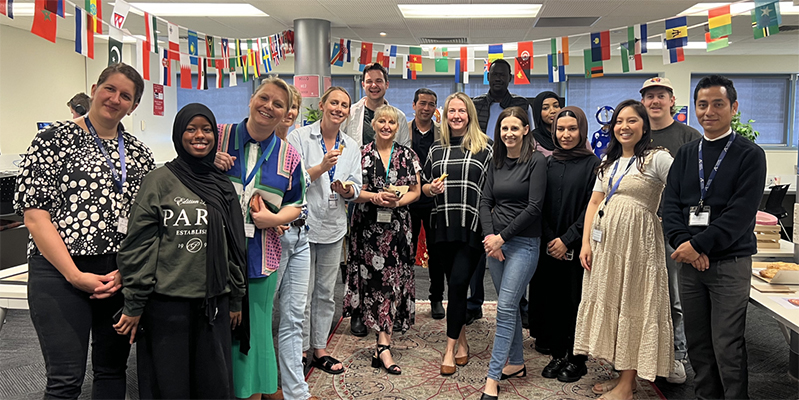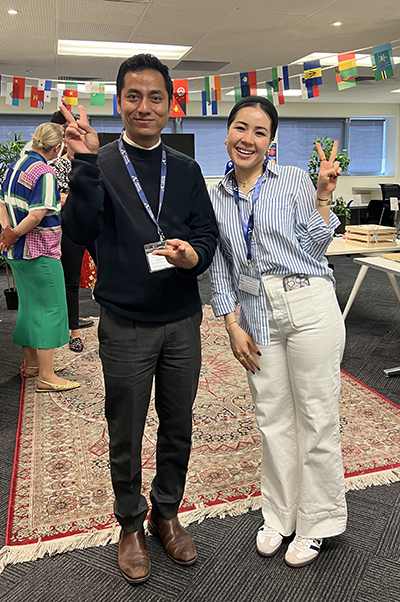Peer support group a shining light for refugee students
By Melissa Keogh
 EDUCATION The Refugee Student Support Group celebrates the cultural diversity of the refugee students.
EDUCATION The Refugee Student Support Group celebrates the cultural diversity of the refugee students.A UniSA student support group is helping refugee students to participate meaningfully in and integrate more effectively into the community.
UniSA’s Refugee Student Support Group, run by UniSA College, is a peer-support initiative, which aims to offer refugee and migrant student support to improve their academic outcomes and socioeconomic opportunities, leading to improved engagement and retention.
The peer support group was established within the college in 2019 with funding from a federal Fostering Integration Grant through the Department of Home Affairs. It continues to go from strength to strength, with a series of employability workshops and cultural diversity celebration events held recently, helping to foster a sense of inclusivity.
UniSA Education Futures senior lecturer Dr Snjezana Bilic, who co-leads the support group with Student Success Coordinator Teresa Thái, says about 12% of UniSA College’s students have refugee backgrounds.
“Research has shown that these initiatives help students feel a sense of belonging, which is pertinent given the South Australian Commissioner for Children and Young People’s 2024 report on ‘Everyday Racism’ highlighting that many young people of refugee backgrounds experience racism in a range of societal settings,” Dr Bilic says.
“As the report outlines, a sense of belonging and inclusion are vital to young people's development and therefore it’s essential we do all we can to ensure students from refugee backgrounds feel safe and included at university and in the community.”
Dr Bilic says that while many refugee students succeed in their tertiary studies, they still encounter significant obstacles including language barriers and employability challenges.
Peer Support Officers (PSOs) within the support group have been helping to break some of these barriers, providing face-to-face support in helping students progress with academic, language and social practices.
Student Success Coordinator Teresa Thái says the PSOs also contribute to the planning, development and implementation of early intervention strategies for refugee students who are identified as at risk. This is done in collaboration with key stakeholders across the University.
“It’s an incredible privilege to work alongside refugee PSOs as they assist one another and celebrate the rich cultural diversity at our college,” she says. “Mentoring and employing the next generation of community leaders is both a joy and an investment in a brighter future.”
 Refugee Peer Support Officers Go Suan Pau and Shikeba Mohammadi.
Refugee Peer Support Officers Go Suan Pau and Shikeba Mohammadi.Shikeba Mohammadi and Go Suan Pau came on board as PSOs in 2024, engaging with refugee students to support them with their transition to university and to identify any potential challenges that may impact their studies.
Skikeba says a recent employability workshop, including resume and cover writing aspects as well as tips on networking and updating LinkedIn profiles, allowed students to seek individual guidance and tailored feedback.
“This interactive approach encouraged deep learning, as students could directly apply techniques like the STAR method into their resumes and LinkedIn profiles,” Skikeba says. “The opportunity to practice elevator pitches and engage in discussions about real-world networking strategies further helped students build confidence and directly enhance their professional skills.”
Go helped run a recent Celebrating Cultural Diversity event, which allowed students to explore and celebrate a wide range of cultural traditions.
“A key highlight – many of the students brought cultural ornaments, sparking curiosity and creating a rich dialogue that deepened their cultural understanding,” Go says. “The collaborative atmosphere left students with a deeper appreciation of cultural differences and a stronger sense of belonging within the UniSA College community.”
Other Stories
- $2.5m gift powers new Aboriginal Knowledges Centre
- Interest rate cuts, lower inflation, trade shifts – will Australia’s economy find its stride in 2025?
- Myth busted: How long healthy habits actually take to set in
- Watch shows together, talk about them and have dance parties: how to rebalance screen use after the holidays
- From the Vice Chancellor: The collective power of individuals
- Achievements and Announcements
- Army Reservists in the firing line from unsupportive managers
- Record number of UniSA students to explore the Indo-Pacific on New Colombo Plan Scholarships
- Peer Support Group a shining light for refugee students
- In Pictures: MOD.’s new exhibition rethinks time, memory and mortality




